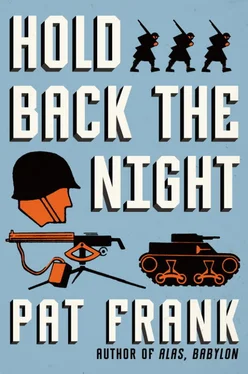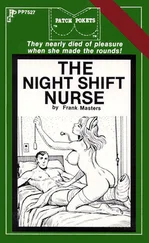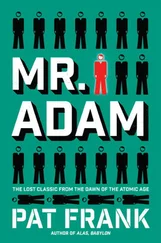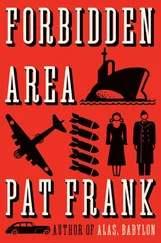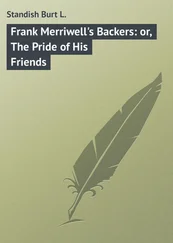This war between the free world and the slave world could carry on for generations, as had other wars, but this one was more important, because it might decide things forever. This thing in Korea didn’t look like much. It looked ridiculous. It was a skirmish over a piece of third-class real estate of no strategic importance. Yet it would be decisive, Mackenzie sensed. It was a clash of wills. What was the final objective of warfare? He brought it out of the textbooks, “to break the will of the enemy.” Here in Korea, somebody’s will was going to be broken.
And if this war was important, then Dog Company was important, because Dog Company had the duty. It was necessary that the First Marine Division reach the coast intact, whether or not there was an evacuation. It was necessary his regiment get through, and this depended upon Dog Company’s aptitude on the flank.
If the Marines were destroyed, or so battered they could not soon again be committed to combat, it’d make a difference. It would influence the Army commander, back in Pusan, and even the theater general, in Tokyo. They had little enough, the Americans. They couldn’t afford to lose a division. They could afford to lose a company, but not a division. And if Tokyo was disheartened, then Washington would be shaken. Washington might decide it had all been a mistake, and draw back, and once having committed itself to drawing back, Washington might decide to draw back all the way—to the shores of North America. To isolation, on the shores of North America.
It was a damn shame that the young ones, and the good ones, had to die first. It was a goddam shame that a boy like Bishop got blown to shreds by a Russian shell out of a Russian barrel fired from a Russian tank, when Bishop had never had a chance to shoot back at Russians. But if Dog Company won out in the end, then Bishop had got in his licks, because it was to be decided here. Here, in Korea. Sam Mackenzie slammed his open palm on the floor hard enough to kill a man.
“Go to sleep, Sam,” said Raleigh Couzens.
“Okay,” Mackenzie said, and he slept.
DOG COMPANY PULLED out of Koto-Ri at 0600. Everybody rode rubber. Mackenzie had eight jeeps, three six-by-sixes, and two weapons carriers. The radio jeep led the column, snaking out through the Koto-Ri streets until Ekland located the narrow set of tracks that Dog Company had been instructed to follow to the sea. They left habitations and paddy fields behind, and the hills rose slowly around them. The sound of artillery defending the Koto-Ri strip became a dull thump, like distant drums, out of rhythm.
Then the sounds of war faded entirely, and Dog Company was alone. It was lonely on that road, lonely and cold and desolate, and all of them were afraid, although their fear was visible only in a negative way, by their silence. Dog Company had left the protective arm of Division, and Regiment, and Battalion. Dog Company was on its own. Later, in the official action reports, it would be called a Task Force, but it was a task force without much punch or power. Even the private soldiers, the riflemen, who never were told anything, sensed this isolation, this nakedness, and sought the comfort of a buddy’s shoulder in the six-by-sixes and the weapons carriers. The private soldiers, almost all of them, were very young. They were so young that in the unusual and scanty periods of peace, referred to as “ordinary times,” they would have been office boys and soda jerks and filling-station flunkies and Golden Gloves fighters and cowhands and grocery clerks. Yet there was this distinctive thing about them. They had volunteered. They were distinct and apart.
There was no sign of the enemy. And all the people, the people that armies call “indigenous personnel,” seemed to have disappeared. This disturbed Mackenzie. “Where are the people?” he asked Ekland.
“Beats me,” said Ekland. “Except—”
“Except what?”
“Except I haven’t seen any civilian traffic. None at all. I haven’t seen any ox carts, or anything. It isn’t natural. There ought to be some movement on this road. You always see something, maybe only an old woman with a goat, or some kids crying.”
“The poor kids,” said Mackenzie. “They don’t know what it’s all about.”
“I’d go crazy if I had a kid and he was lost and alone and hungry, like these Korean kids,” said Ekland.
“Ever think of getting married?” said Mackenzie.
This was the first time that the captain had inquired about his private life, and it was not a usual thing. Usually, a company skipper avoided speaking of the private life of his men, for with some of the men it was a touchy matter. For some of the men the anonymity of a uniform was protective coloration, as in the French Foreign Legion, and they would resent it if an officer asked about their private lives. But since the captain had asked, and since the captain was sensitive to the thoughts and moods of his men, Ekland knew that he was genuinely interested, and not just curious, and Ekland felt he could speak frankly to the captain. “I should be married,” he said. “By rights I should be married right now. I should be married and have my feet propped up on a hassock in my living room and be watching the Army-Navy game. Today’s Saturday, isn’t it?”
“Damned if I know.”
“Well, if it’s Saturday that’s what I ought to be doing. I ought to have a wife and a good job with NBC, and not be wandering around some place at the rear end of the earth expecting to get my head blown off any minute.”
“Well, why didn’t you get married, instead of coming back in?”
Ekland laughed. “It was necessary that I save the world. Crazy, that’s what we were. Nuts.”
He twisted the wheel, and they skidded, and stopped, for in his thoughts of himself he had forgotten that he was at the head of the column, and those behind could not keep pace.
“Those civilians are hiding,” the captain said. “Hiding like small game when the tigers are out.”
“We’re not tigers,” said Ekland.
“They are,” said Mackenzie. “They’re tigers.”
The jeep crept forward again, and both of them were silent, but they were thinking the same thing. They were under observation. They could see nothing, but they could feel it. When they reached a point where the road was wide enough for vehicles to pass comfortably, Mackenzie told Ekland to stop. “I’m going to shuffle up the column,” he said. “We want more firepower up front here.”
He put the jeep with the seventy-five in the van, and behind it a jeep mounting a fifty-calibre machine gun, and also carrying Ackerman, his serious bazooka man. He himself, in the radio jeep, took station between the weapons carriers in the center of the column. He had a heavy machine gun bring up the rear. Then, as an afterthought, he sent a four-man jeep patrol far out in front. He wished he had skirmishers on his flanks, too, but there wasn’t time for movement afoot. He had to keep pace with Regiment. And the terrain was nasty.
The terrain got worse. The road climbed interminably, but the mountains climbed faster on either side, and it developed, finally, that they were ascending through a gorge, a cliff binding their right, while on the left the road fell steeply away into a canyon. In this gorge the wind rose, and it seemed to grow colder. It was not really that it grew colder. It was simply that the wind provided the cold with a weapon, a thin blade to slice through the tiniest crevice in a man’s clothes, and to stab at his mouth and eyes.
When a man is very cold, or very hot, it is difficult for him to stay alert for danger. The immediate discomfort is more pressing than the unseen threat. Mackenzie realized this, and so he forced himself to ignore the wind, and the cold, and concentrate on his job.
Читать дальше
